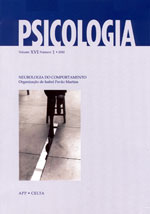Frontal lobe sydromes and clinical assessment
DOI:
https://doi.org/10.17575/rpsicol.v16i1.472Keywords:
-Abstract
The author summarizes the literature concerning the frontal lobes (FL) in a neuropsychological and neurological perspective, based in patient lesion studies and activation/functional data in normal individuals. The neuropsychological features of frontal lobe lesions (mainly prefrontal cortex – PFC ones) are heterogeneous and exemplified by clinical cases. The FL role is more probably due to its specific functional connections between or with different brain areas, including other cortices, limbic system and thalamus, then to an intrinsic quality. Former authors have discussed different PFC executive and behavioral functions versus one single unitary one (e.g. working memory, inhibitory control). The correlations between functions and specific PFC areas (right/left or dorsolateral/internal/orbital) are also reviewed. Finally, laboratorial tests that aim at evaluating initiative and fluency, planning capacity, regulation, attention, inhibition of interference, abstraction capacity, metal flexibility and specific aspects of memory, emotion and behavior are described.


